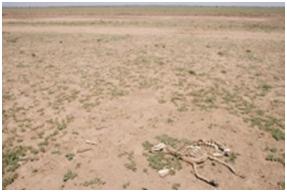The Horn of Africa is experiencing its worst drought in half a century, putting about 10 million people at risk for famine. The United Nations has already declared a famine in two regions of southern Somalia, and without immediate action the crisis is likely to get worse. “If we don’t act now, famine will spread to all eight regions of southern Somalia within two months, due to poor harvests and infectious disease outbreaks,” said Mark Bowden, the UN Humanitarian Coordinator for Somalia.

According to Bowden, 3.7 million people in Somalia – nearly half the population – are currently in crisis. Malnutrition rates in this country are the highest in the world. Tens of thousands of Somalis have died in just the last few months due to causes related to malnutrition.
More than 100,000 Somalis have fled to refugee camps in Kenya to escape what aid workers are calling the worst food crisis since a famine in Ethiopia in the mid-1980s when 1 million people died.
The UN is appealing for urgent aid. According to Bowden, roughly $300 million is needed in the next two months to provide adequate assistance to famine-affected areas. “Every day of delay in assistance is literally a matter of life or death for children and their families in the famine-affected areas,” he said.
A number of humanitarian organizations, including The World Food Programme, Oxfam, and others are stepping up efforts to provide assistance to Somalia and other drought-affected regions in Africa. For more information on these operations, including links to organizations accepting donations, click here.
By Dana Drugmand

Danielle Nierenberg, an expert on livestock and sustainability, currently serves as Project Director of State of World 2011 for the Worldwatch Institute, a Washington, DC-based environmental think tank. Her knowledge of factory farming and its global spread and sustainable agriculture has been cited widely in the New York Times Magazine, the International Herald Tribune, the Washington Post, and
other publications.
Danielle worked for two years as a Peace Corps volunteer in the Dominican Republic. She is currently traveling across Africa looking at innovations that are working to alleviate hunger and poverty and blogging everyday at Worldwatch Institute’s Nourishing the Planet. She has a regular column with the Mail & Guardian, the Kansas City Star, and the Huffington Post and her writing was been featured in newspapers across Africa including the Cape Town Argus, the Zambia Daily Mail, Coast Week (Kenya), and other African publications. She holds an M.S. in agriculture, food, and environment from Tufts University and a B.A. in environmental policy from Monmouth College.








